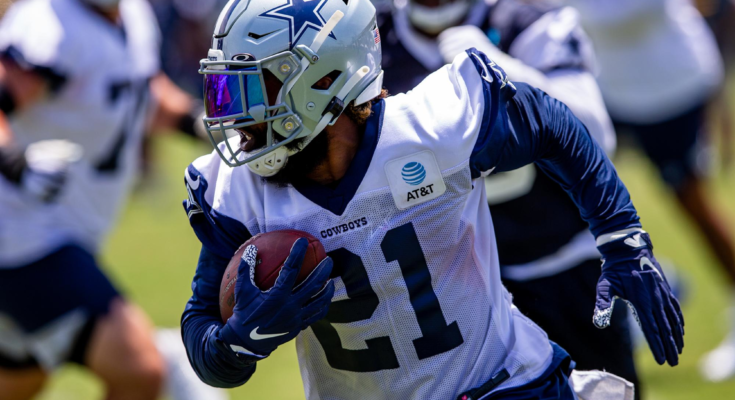OXNARD, Calif. — Last summer Ezekiel Elliott became the highest profile Dallas Cowboys player to contract COVID-19, testing positive for the virus on the doorstep of the 2020 preseason. This year, he says he made the choice to get vaccinated.
Despite having some first-hand knowledge of COVID’s impact, Elliott says he won’t be advising other players on their decision as Dallas tries to reach the league’s proposed 85 percent vaccination standard.
“That’s kind of a touchy subject,” Elliott said of player vaccinations. “You can’t really tell somebody what do with their body. I grew up in a family where we didn’t get vaccines. It’s kind of hard to tell someone who [during] their whole life their mom and dad tell them not to get vaccines, [to tell that person] to go get vaccinated. It’s everyone’s body. You can’t tell them what to do with it.
“I got the vaccine just because I wanted to put myself in the best situation to be out there for my team week in and week out. I mean, not everyone feels that strongly or maybe other people still have their view of vaccines. You can’t force someone to do something they don’t want to do with their body.”
While the NFL can’t come out and say it disagrees with that premise, the league is now getting about as close as it can to making vaccines mandatory. After first implementing a campaign to inform players about the vaccines and then a series of incentives to encourage getting the shot, the NFL took a more drastic step Thursday, essentially threatening franchises and players with significant monetary impacts for any schedule disruptions tied to COVID infections.
That included an eyebrow-raising financial hammer that would come down on franchise owners and players, with the league stating that if a team is found to disrupt the schedule due to coronavirus infections, both teams in the game will surrender game checks for all players, and the team responsible for the schedule disruption will forfeit the game and be responsible for covering all monetary costs incurred by the other team during the game week.
It was news that caught the attention of some Cowboys players when they learned of it coming off the practice field during the first day of training camp.
“You said a game check?” a shocked Elliott said Thursday, before bursting into laughter at his own reaction. “I mean, you just told me something new.”
It was a new piece of information being absorbed across the league Thursday, prompting a smattering of reactions from players who are taking notice of the league’s harder drawn line. That included Arizona Cardinals wideout DeAndre Hopkins, who tweeted and then deleted a message that appeared to suggest retirement as an option versus the league’s new stance on vaccines.
“Never thought I would say this, but being put in a position to hurt my team because I don’t want to partake in the vaccine is making me question my future in the NFL,” Hopkins tweeted.
It’s only the latest foray of debate over the NFL’s hard push to get the majority of its players vaccinated, which has recently included argumentative flash points involving Buffalo Bills wideout Cole Beasley — who has been stridently anti-vaccination — and Hall of Famer Michael Irvin, who suggested to ESPN that unvaccinated Cowboys players are showing they aren’t all-in on winning a Super Bowl.
Both of those points did a good job of showcasing the increasing awkwardness the vaccination debate can create inside franchises. Beasley’s repeated anti-vaccination complaints caused some to suggest that fellow Bills wide receiver Stefon Diggs was taking a subtle shot at his teammate Thursday when Diggs cryptically tweeted “accountability … availability.” And when Cowboys owner Jerry Jones was asked about Irvin’s suggestion that refusing to get the vaccine equated to not being all-in on a Super Bowl, Jones spoke glowingly about Irvin’s dedication and called his dedication “an outstanding message.”
To say the least, it’s all speaking to a national vaccine controversy that is making its way into locker rooms. It’s something Elliott said he understands, despite his choice to get the shot.
“Like I said, it’s everyone’s body,” Elliott said. “You’ve got to respect that. You can’t just — [fining someone] a check is only monetary. You can’t put a price on someone’s health or what they think will make them feel good or not make them feel good. You’re kind of walking a tight line.”
Elliott isn’t the first player to talk about being careful about that line. Cowboys quarterback Dak Prescott has suggested the same thing in the past few months while refusing to state his feelings on the vaccine or the league’s efforts. But walking the line — or the existence of a line — is no longer up for debate. The NFL made that much clear Thursday. A line exists. And if players and teams cross it, there will be serious financial consequences in 2021.
More from Yahoo Sports:


